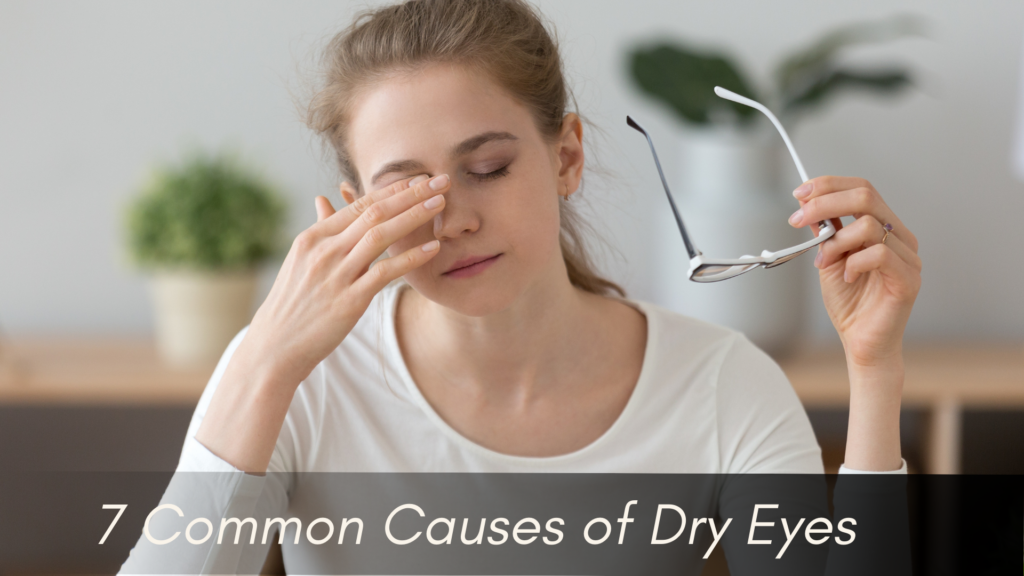
Have you ever found yourself blinking repeatedly, trying to clear that dry, gritty feeling in your eyes? It’s something many people experience, often without knowing exactly why it’s happening or how to fix it.
If this sounds familiar, you’re in the right place. Dry eyes can have a variety of causes, and understanding them is the first step to relief. This guide will take you through seven common reasons your eyes might feel so dry and provide easy, actionable steps to bring back the moisture and comfort of your eyes.
What Causes Dry Eye?
Dry eyes can be triggered by several factors that range from environmental conditions to specific lifestyle choices. When our eyes don’t produce enough tears, or the right kind of tears, we feel that dryness set in. Here are the main reasons. And remember, identifying the cause can help guide you to the right solution!
1. Screen Time Overload
In today’s digital world, screen time is nearly impossible to avoid. However, extended hours in front of computers, phones, or tablets can be tough on our eyes. Here’s why: when we’re focused on a screen, we tend to blink less often, and each blink is crucial for spreading tears across the eye’s surface. With fewer blinks, our eyes don’t get the moisture they need, leading to that classic dryness and irritation.
How to Fix It:
- Try the 20-20-20 rule: every 20 minutes, look at something 20 feet away for at least 20 seconds. This encourages you to blink and gives your eyes a break from close-up focus.
- Adjust your screen’s position so it’s slightly lower than eye level. This reduces the amount of your eye’s surface exposed to the air.
- Use blue light-blocking glasses or screen filters to reduce strain. Although blue light itself doesn’t cause dryness, reducing glare can make screen time more comfortable.
| Screen Time Tips | Benefit |
| 20-20-20 rule | Increases blink rate and eye moisture |
| Lower screen height | Decreases eye surface exposure |
| Blue light filters | Reduces strain, making screens easier on the eyes |
2. Aging
As we age, the glands that produce tears may slow down. Additionally, hormonal changes, especially during menopause, can impact tear production, leading to a decrease in the quality and quantity of tears.
How to Fix It:
- Consider using over-the-counter lubricating eye drops that mimic natural tears. They can be used throughout the day for added comfort.
- Omega-3 supplements are often recommended for their role in supporting eye health and tear production. Speak with your healthcare provider before starting any new supplement.
- Be gentle when applying eye makeup and avoid harsh cleansers around the eye area, as these can interfere with your natural tear balance.
3. Contact Lenses
If you’re a contact lens wearer, you might already know that they can sometimes cause dryness. Contact lenses sit directly on your eyes, which means they can impact how your tears work. Some types of lenses, especially older or less breathable materials, can decrease natural moisture by either soaking up tears or reducing oxygen flow to the eyes.
How to Fix It:
- Use daily disposable lenses, which are often better for dry eye since they’re replaced regularly and don’t gather debris that can irritate.
- Ask your optometrist about newer, moisture-retaining lenses designed for sensitive and dry eyes.
- Consider wearing glasses on certain days to give your eyes a break, especially if you’ll be spending hours on screens or in dry environments.
4. Medications
Many common medications can contribute to dry eye as a side effect. Certain drugs, especially those that have a drying effect on the body, can reduce tear production or change the composition of tears, making it harder for the eyes to stay moist. Some common culprits include antihistamines (used for allergies), antidepressants, blood pressure medications, etc.
How to Fix It:
- Check with Your Doctor: If you suspect your medication is causing dry eye, consult with your healthcare provider. They may suggest an alternative or adjust your dosage to help alleviate the symptoms.
- Use Lubricating Eye Drops: Artificial tears can help compensate for reduced tear production, providing relief when dryness is noticeable.
- Stay Hydrated: Certain medications can make you more prone to dehydration, so drinking plenty of water can be a big help in maintaining moisture levels.
5. Environment and Weather
Sometimes, it’s not what you’re doing but where you are that contributes to dry eye. Environmental factors like wind, smoke, air conditioning, and heating can all suck the moisture right out of the air—and your eyes.
How to Fix It:
- Use a humidifier at home or work to increase moisture in the air, especially in winter when heating systems dry out indoor spaces.
- Wear wraparound sunglasses to protect your eyes from the wind and dust when you’re outside.
- Stay hydrated! Drinking water regularly keeps your body, including your eyes, hydrated and less susceptible to drying out.
| Environmental Adjustments | Effect |
| Use a humidifier | Adds moisture to the air |
| Wraparound sunglasses | Shields eyes from wind and dust |
| Regular hydration | Supports overall eye moisture |
6. Allergies
Seasonal allergies or environmental allergens can make your eyes feel itchy, red, and dry. When you experience allergies, your body releases histamines, which can cause inflammation in the eyes and interfere with tear production. Pollen, dust, pet dander, and even certain foods can trigger these allergic reactions, leading to the discomfort of dry, irritated eyes.
How to Fix It:
- Use Allergy Eye Drops: Over-the-counter allergy drops can help relieve the itchiness and dryness caused by allergies. Look for drops specifically formulated for allergic eye symptoms.
- Avoid Triggers When Possible: Try to limit exposure to allergens by keeping windows closed during high pollen seasons, using air purifiers, and frequently washing hands and face.
7. Poor Diet
A balanced diet is essential for overall health, and eye health is no exception. Certain nutrients, like Vitamin A and Omega-3 fatty acids, are especially important for tear production and quality. Without these essential nutrients, eyes are more likely to feel dry and uncomfortable.
How to Fix It:
- Incorporate Omega-3-Rich Foods: Foods like salmon, flaxseeds, and walnuts are high in Omega-3 fatty acids, which can support healthy tear production.
- Eat Vitamin A-Rich Foods: Carrots, sweet potatoes, and leafy greens are rich in Vitamin A, which is crucial for eye health.
- Drink Plenty of Water: Staying hydrated helps your body produce the moisture it needs, including tears.
| Dietary Recommendations | Benefit |
| Omega-3 fatty acids | Supports tear production |
| Vitamin A-rich foods | Essential for eye health |
| Regular water intake | Maintains body and eye hydration |
Pro tip: Check Out The Connection Between Dry Eyes and Your Diet: What to Eat for Healthier Eyes.
Pros and Cons of Common Solutions
| Solution | Pros | Cons |
| Artificial Tears | Easy, over-the-counter | Temporary relief only |
| Prescription Eye Drops | Longer-lasting relief | Potential side effects |
| Lifestyle Adjustments | No cost, generally healthier overall | May require habit changes |
| Omega-3 Supplements | Benefits eye health and body | May take time to see benefits |
Additional Tips
- Blink more consciously when using screens.
- Consider using a mobile app like VisionUp for eye health. VisionUp guides you with eye exercises that are specifically designed to relieve strain and improve eye hydration.
Recommended resource: Explore Dr. William H. Bates’ classic book, The Bates Method for Better Eyesight Without Glasses, for eye exercises and relaxation techniques.
